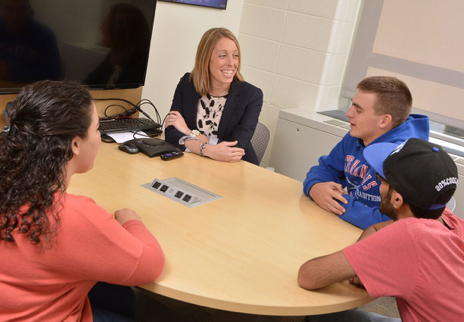Blog Entries
Tell me about yourself: What your interviewer thinks of your answer
A blank stare. A professional nod. A brief “thank you for your answer.” Lots of notes. As you sit sweating through your job interview, an impassive interviewer can be both intimidating and confusing.
Every professional conversation is different, but in many situations, you can walk out of your job interview and have no idea what your interviewer’s impression was. Particularly for phone interviews, it can be hard to get a sense of what the employer is liking versus what they are seeing as problematic or unremarkable. And yeah, it’s stressful.
As a third-year Career Ambassador, I have conducted dozens of mock interviews for my fellow students, acting as a future employer or hiring manager for a range of potential careers. Over the years, when I ask students to tell me about themselves, I’ve heard some really good answers that made me quite interested in the “applicant,” but I’ve also heard some answers that made me cringe inwardly.
In today’s blog, I’m going to bring you into the mind of the interviewer and shed some light on the question “tell me about yourself,” as well as demonstrate the kinds of answers that set you apart in a good way--and the ones that most certainly do not. Obviously, my impressions and experiences are subjective, but understanding the thought process of at least one interviewer is a good place to start when you’re preparing for your next application.
In the DeSales Career Center, we begin almost every interview with the open-ended “tell me about yourself.” This puts interviewees in the tricky position of navigating how much information to express, and what kind.
Most students who come in to interview tell me something along the lines of “I’m Jane Roe. I’m from Center Valley, PA. I have a pitbull named Daisy and I love skiing and drawing, and I’ve wanted to be a sports manager for several years now.”
Not that I don’t love to hear about which breed of dog you have back home, but what the employer really wants with this first question is “you in a nutshell.” In other words, who you are, what you’ve done, and what you hope to do. Over the course of the interview, your interests and personality will come out as you answer the employer’s questions, but for the first impression, you want to convey to the employer competence and professionalism. Plus, you want your answer to already show why you would be a good fit for this position, as well as prompt the employer to ask you follow-up questions on your credentials. That doesn’t mean that you can’t include some more personal details, but they have to be relevant. If your passion for skiing is what led you to your interest in Sports Management, then by all means explain that connection.
But as cynical as it sounds, your hobbies and interests are the last things your employer will consider when deciding whether to hire you, so don’t make them the first thing that you bring up.
“My name is John Doe, and I usually go by Johnny. I’m currently a Student Physical Therapist at DeSales University, and my four clinical rotations so far have given me a particular interest in neurological therapy. Moving forward, I hope to become board certified and continue the research that I began last year on hand-eye coordination in stroke patients.”
This answer is succinct, informative, and professional. Johnny could consider tying in the job at hand, explaining how he came to find and desire the position he’s interviewing for. But otherwise, Johnny’s first impression to the impassive interviewer is a good one.
When in doubt, just remind yourself why you’re there in the interview room, and let that reason guide your answer. Have a focus to what you say and an ultimate point to convey. And don’t let your anxieties and worries about what the employer is thinking throw you off!
Hopefully, now that you have a sense of what at least one interviewer thinks of typical “tell me about yourself” answers, you can quell your nerves and rest assured that your professional and focused answer will make the impression you desire.


Follow Career Development Center on Social
CDC on Facebook
Stay up to date with Career Development Center's posts on Facebook.
CDC on LinkedIn
See the latest posts on LinkedIn by the Career Development Center. Follow them on LinkedIn.
CDC on Instagram
See the latest posts on Instagram by Career Development Center.




